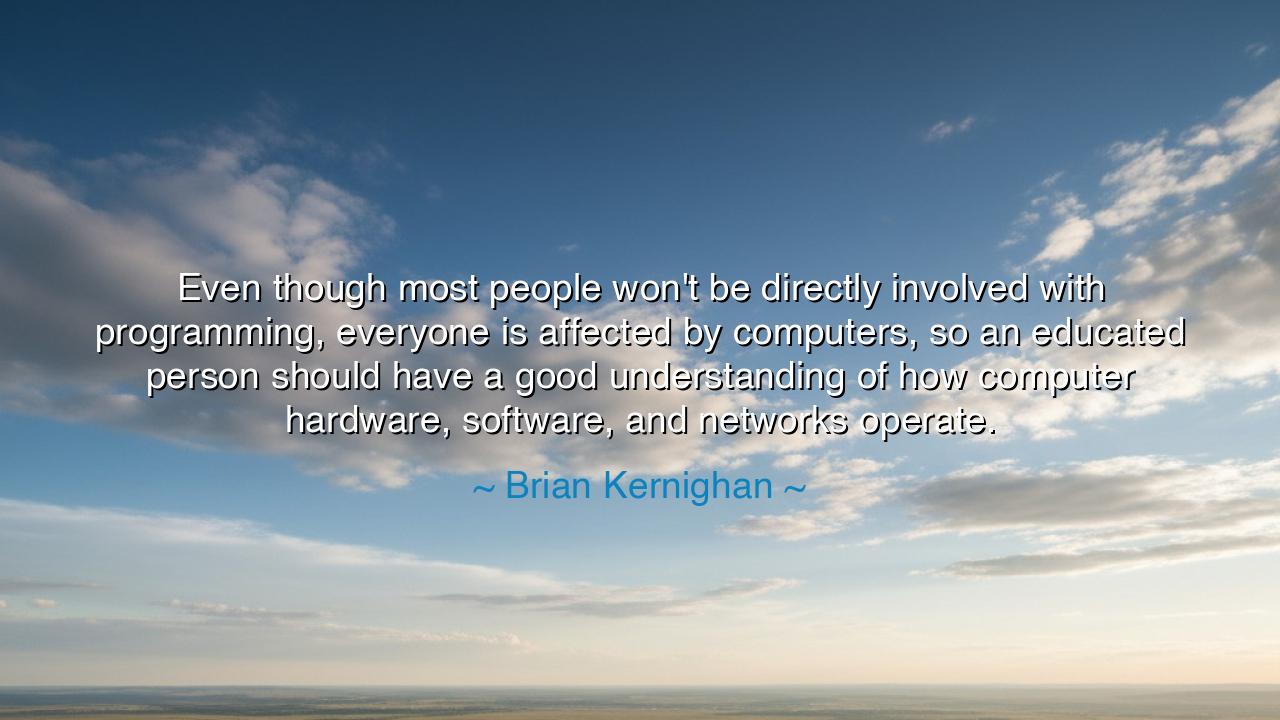
Even though most people won't be directly involved with
Even though most people won't be directly involved with programming, everyone is affected by computers, so an educated person should have a good understanding of how computer hardware, software, and networks operate.






In this age of invisible lightning and silent intelligence, when the hum of machines threads through every home and heart, Brian Kernighan, one of the ancient architects of the digital dawn, spoke a truth that echoes with timeless gravity: “Even though most people won't be directly involved with programming, everyone is affected by computers, so an educated person should have a good understanding of how computer hardware, software, and networks operate.” These words, though modern in sound, carry the soul of an eternal teaching — that no civilization endures unless its people understand the powers that shape their world. Kernighan, who helped forge the language of computers themselves, was not merely speaking of circuits and code, but of wisdom, of the duty to comprehend the forces that define our destiny.
In the beginning of the digital age — an era not so distant from our own — the computer was a mysterious oracle, a vast and humming intellect confined to laboratories and universities. Few could imagine that one day, it would dwell in every pocket, whispering through every device, guiding commerce, medicine, art, and war alike. Yet Kernighan saw what others did not: that the day would come when every life would be touched, shaped, even governed by these machines. His warning is gentle, but it is a warning nonetheless — that those who live among the powerful must not remain ignorant of their power. For when knowledge is surrendered, freedom soon follows.
Think, then, of the Industrial Revolution, when great engines transformed the world. In those days, the few who understood the workings of steam and steel ruled over the many who did not. The factory workers, unknowing of the mechanisms they served, became cogs in a system beyond their sight. So too now, in the Digital Revolution, the same danger stirs. Those who understand hardware, software, and networks — who know the ways of the algorithm and the secret paths of data — hold the keys to influence, while those who do not remain at the mercy of forces they cannot see. Kernighan’s wisdom is not about computers alone; it is about empowerment, the defense of human dignity through knowledge.
Consider also the story of Ada Lovelace, the daughter of the poet Byron, who in the nineteenth century studied the designs of Charles Babbage’s Analytical Engine. While many dismissed it as a mechanical curiosity, she saw deeper — that it could one day weave patterns of logic as the loom weaves flowers into fabric. She understood that to know the machine was to know the language of the future. And though her time did not yet see the rise of the computer, her vision became prophecy. In her, we find the same spirit Kernighan calls for in us — a mind unafraid to look beneath the surface, to learn the structure of creation, and thus to take part in its shaping.
When Kernighan speaks of the need for an educated person to understand the digital world, he does not mean that all must become programmers or engineers. Rather, he urges that we become conscious participants, not passive inhabitants, of our age. To know how software works is to see how decisions are made in the world of automation; to understand networks is to perceive how information flows — and how truth can be twisted or concealed. Ignorance of these things is no longer harmless; it is perilous. For in this new realm, data is power, and those who command it can rule without crown or army.
Therefore, my listener, take this teaching not as a burden, but as a calling. Just as the ancients learned the language of stars to navigate the sea, so must we learn the language of machines to navigate our century. Do not say, “This is not for me,” for every message you send, every transaction you make, every word you read online is woven into this vast and living web. Learn enough to see its patterns, enough to question its promises, enough to guard your freedom within it. Understanding, not blind trust, is the armor of the modern soul.
For the lesson of Kernighan’s words is both urgent and eternal: knowledge is not only for the scholar, but for the citizen. When we comprehend the tools that shape us, we remain masters of our fate. When we do not, we become subjects of an unseen empire. So study not merely for profit, but for wisdom. Seek to know the inner workings of the age you live in. For in understanding the hardware of the world, you protect the software of your spirit — and keep alive the most sacred code of all: the freedom to think, to choose, and to know.






AAdministratorAdministrator
Welcome, honored guests. Please leave a comment, we will respond soon